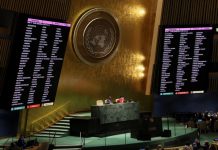
LOUISVILLE: Information made public on the police killing of Breonna Taylor — a 26-year-old Black woman killed in March by Louisville police executing a search warrant at her apartment in Louisville, Kentucky — after audio from 15 hours of grand jury proceedings surrounding the case was released on Friday.
While grand jury proceedings are secret and their recordings rarely disclosed, a Kentucky judge ordered the state’s Attorney General Daniel Cameron to publicly share the tapes following nationwide protests in response to the case. The recording included officers’ testimony but did not include the prosecutor recommendations (as to what charges are being levelled against the defendants by the prosecution) or jury deliberations. Kentucky is one of the minority states in the US that does not require such recordings by law.
In the recordings police claims they knocked several times on Ms. Taylor’s apartment and announced themselves. Whereas Taylor’s boyfriend, Kenneth Walker, said he didn’t hear police announce themselves. Had they done so, “it changes the whole situation because there’s nothing for us to be scared of,” Walker said. That issue is one of several points of contention in the wake of the grand jury’s decision last week in the case of Ms. Taylor.
The grand jury indicted Mr. Hankison on three counts of wanton endangerment, stemming from bullets fired recklessly into a neighbouring apartment. Under Kentucky law, wanton endangerment involves conduct that creates a substantial danger of death or severe injury, while showing indifference to human life. But not the two officers—Sgt. Jonathan Mattingly and Detective Myles Cosgrove—who officials say fatally shot Ms. Taylor.
According to testimony before the grand jury, there was no body-camera footage until after the incident. Tony James— an officer who was photographed wearing a body camera after Taylor was shot and killed— thought he had activated it but he hadn’t. Though other officers weren’t wearing body cameras, James’ failure to activate his would constitute a violation of LMPD’s rules.
The charges levelled against the officers highlights the systematic issue with the justice system in catering to Black Americans; it fails to deliver. The verdict sparked protests during which two Louisville officers were shot. Riot police with batons dispersed a group of protesters confronting a line of police in the street, live video footage of the incident showed. At one point, officers used tear gas, and they took several people into custody. Similarly, after use of force at George Floyd protests across the U.S. at least 40 lawsuits claimed police brutality.
The #BlackLivesMatter movement has consistently highlighted the structural racism in the judicial system that fails to punish police brutality against black Americans. This particular case is surprising for many as the charges levelled against the police were not of manslaughter or murder. This was as revealed by Attorney General Cameron, a Republican and the state’s first African American attorney general, that he did not recommend homicide charges for the officers involved. Even with a Black Attorney General that prosecution did not make the charges against the police serious enough.
In the latest statements by the BLM movement, Britain is at the receiving end of harsh criticism as evidence surfaces that the riot gear used against protestors by the police was manufactured in Britain. BLM for long has called Non-White individuals all around the world to speak against the international anti-blackness; the structures of power globally that disadvantage black and non-white individuals and also facilitates state violence against them. This supra-territorial narrative of black solidarity has been well received in Europe by the black community. Recently Meghan Markel and Prince Harry made statements in support of claims against structural racism and unequal access to services for Black Britons. Similarly, in Belgium statues and memorials to King Leopold II have been taken down for his role in Congo, Africa, where he perpetrated one of the worst human rights violations in the modern age as a result of which 10 million people died in the Congo. His descendant, the current King Philippe of Belgium, expressed remorse at the role his ancestor played in the “acts of violence and cruelty” that took place in the Congo.
The BLM movement continues to hold protests and file lawsuits against police brutality while also working on creating transnational solidarity systems for activism.








